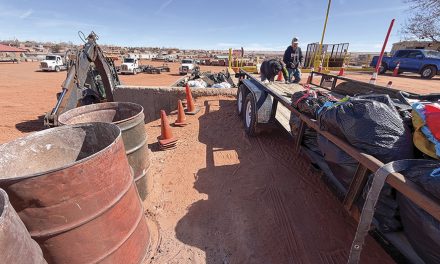
Violence against women act bolsters protections for tribes
WINDOW ROCK
In a victory for Indian Country, on March 11, President Biden signed into law the Violence Against Women Act Reauthorization of 2022, a bipartisan bill backed by Congress as part of the $1.5 trillion Omnibus appropriations package that funds the federal government through September.
Biden said in a statement, “The Violence Against Women Act provides protection against domestic violence, stalking, sexual assault, and to support survivors and help them find a way out of those abusive situations they were locked into because they had no means to leave, with support for rape crisis centers as well as housing and legal assistance.”
As a watershed advancement for the judicial authority of tribes, Biden announced that tribal courts will now be able to exercise jurisdiction over non-Native perpetrators of sexual assault and sex trafficking.
More support will also be provided for legal services for victims and for law enforcement to get the training they need to help handle the trauma survivors are experiencing, he said.
President Jonathan Nez said, “The reauthorization combats crimes by assisting domestic violence prevention, protecting survivors, and promoting safer tribal communities for women, children, and families.”
It was Biden who wrote the groundbreaking Violence Against Women Act as a U.S. senator, landmark legislation that first passed in 1994, which was modified three times since to expand access to safety and support for all domestic and sexual violence survivors and increase prevention efforts.
The White House stated that while incidents of domestic violence and sexual assault have declined significantly since VAWA first took effect, and efforts to increase access to services, healing, and justice for survivors have improved with each iteration of VAWA, much work remains.
The 2022 reauthorization fortifies the law with directives, including expanding special criminal jurisdiction of tribal courts to cover non-Native perpetrators of sexual assault, child abuse, stalking, sex trafficking, and assaults on tribal law enforcement officers on tribal lands.
It increases services and support for survivors from underserved and marginalized communities, including for LGBTQ+ survivors of domestic violence, dating violence, sexual assault and stalking, and for culturally specific services in rural communities. It also improves prevention and response to domestic and sexual violence.
Seth Damon, speaker of the Navajo Nation Council, said, “This bipartisan law sends a message to survivors and the families of victims that we are committed to protecting our women, people with disabilities, and our LGBTQ+ family members.”
Nez said the attached funding in the act also helps with information sharing and the cost of implementation of the greater jurisdiction for tribes.
Path to justice, healing
The Biden administration previously prioritized the crisis of missing or murdered Indigenous people with an executive order directing the departments of Justice, Interior, Homeland Security and Health and Human Services to create a strategy to improve public safety and justice for Native Americans and to address the growing epidemic of missing or murdered Native American women, men and children.
The Department of the Interior also established the Missing and Murdered Unit to pursue justice for victims and survivors.
“We express our deepest gratitude to the Biden-Harris administration for reauthorizing the (act) and recognizing that all persons, including tribal women and children, have the right to live violence-free lives,” said Navajo Nation first lady Phefelia Nez.
The first lady, who is a member of the New Mexico Missing and Murdered Indigenous Women and Relatives Task Force, she has heard countless stories of the pain of victims, survivors and their families due to violent acts.
“The reauthorization ensures that survivors in New Mexico, including the Navajo Nation, receive the resources they deserve to restore, heal and reunite loved ones,” she said.
Delegate Amber Kanazbah Crotty said the act continues to save women and children across Indian Country.
“The reason that many people struggle to leave abusive situations is they are made to feel worthless or are silenced,” said Crotty. “Survivors must feel supported and empowered to move forward in life.”
She said the act now also has the first grant program dedicated to LGBTQ+ domestic violence and sexual assault survivors.
“Every life is precious and people deserve to live a life free of violence and discrimination,” said Crotty.
Delegate Eugenia Charles-Newton, chair of the Law and Order Committee, said there is a need for robust law enforcement on the Navajo Nation as criminal activity has increased in the last few years.
“Currently, there are not enough officers covering approximately 18 million acres of Navajo land,” said Charles-Newton.
She said with the additional support of the new provisions in the act, the Navajo Nation will continue to hold criminals that commit violence or sexual assault fully accountable under federal law.
“Every victim and survivor needs to know that there can be a path to justice and healing with collaborative efforts,” said Navajo Nation second lady Dottie Lizer.
“We need to ensure every survivor in tribal communities has help and resources in a moment of crisis.”








 Highway 264,
Highway 264, I-40, WB @ Winslow
I-40, WB @ Winslow